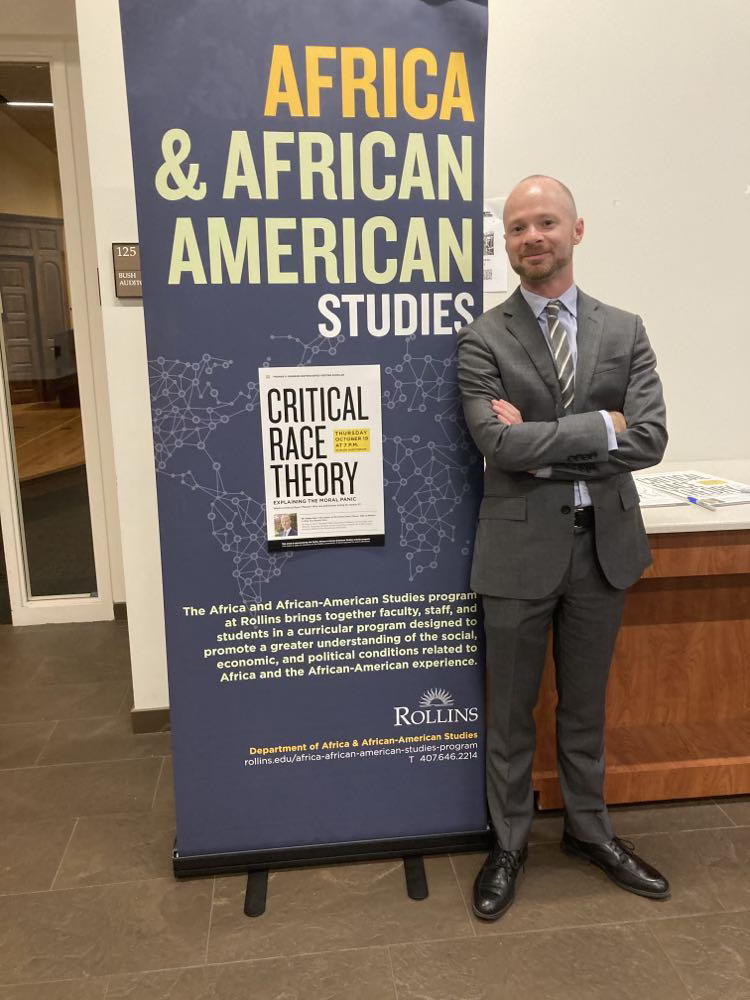
There was an almost electric hum in the air as students, faculty, and staff alike gathered in the Bush Auditorium. For the first night in a long time, academic discourse seemed to be in vogue at Rollins College as Dr. Victor Ray took the stage to present his lecture on Critical Race Theory.
Ray is a veritable expert on the topic of Critical Race Theory, a school of sociological thought that he asserts has been turned into a Republican dog whistle to criticize many policies designed to promote racial equity in the U.S. He is currently the F. Wendell Miller associate professor in the departments of sociology and criminology and African American Studies at the University of Iowa, and he has held fellowships at both The Brookings Institution and the Harvard Kennedy School.
Ray visited Rollins College on Oct 19, where he had lunch with invited students and later presented a talk on his 2022 book On Critical Race Theory: What It Matters & Why You Should Care. Zaria Clark (’25) said that she appreciated the opportunity to have lunch with Dr. Ray in addition to the talk because she “got a little more insight into things as far as how the topic relates to the world in general.”
The event was sponsored by the Rollins African & African-American Studies (AAAS) program. Dr. Matthew Nichter, assistant professor of sociology and the coordinator of the AAAS program, explained why such an event was so important for the campus to be having: “Right-wing politicians want to prevent college students from learning about structural racism. But at Rollins, we reject censorship.”
After opening remarks from Nichter, Ray began his talk with a personal anecdote about the time a person called the police on his dark-skinned uncle for hoisting a two-year-old Ray, who is of mixed race and has lighter skin, onto his shoulders at a parade. This incident signified what Ray describes as the continued effort to “criminalize [Black] family joy” in the U.S. and explains how these sorts of routine discrimination are the very reason that Critical Race Theory holds such relevance for modern scholars.
As Ray outlined his presentation’s thesis over the course of 45 minutes, he deftly transitioned between examples that held especial interest for his Floridian audience and examples that elevated the importance of Critical Race Theory to an international scale. His key takeaways were that CRT is useful in describing the persistence of racial inequality in the U.S. and that, while there are good-faith critiques of it like any academic theory, the moral panic around CRT is a product of politicians and other power brokers “manipulating racism for political advantage.”
A prime example of this manipulation was a story known all too well in Florida. Chris Rufo was appointed to the board of the New College of Florida by Governor Ron DeSantis in Jan. 2023. Rufo has made a name for himself as a member of the Manhattan Institute, a conservative think tank based out of New York. Citing a series of now-deleted posts on X (née Twitter), Ray explained how Rufo admitted to picking the term “critical race theory” as something that he could make people associate with “reading something crazy in the news.”
Ray later followed up on this point while answering a student question, explaining how media coverage that presented the debate around Critical Race Theory and other policies related to racial equity and desegregation as a “both sides issue” gave legitimacy to dissent that is not actually widely held. Ray likened this to the ongoing debate surrounding the existence of global warming, despite it being relatively undisputed by scientists.
When asked about ways to combat racist policies and attacks on educational freedom, Ray encouraged students to do exactly as opponents have done – vote, get involved in local politics if possible, and most importantly to just do something. Ray emphasized that social movements are told as stories of heroic figures standing up to injustice, but in reality, are built out of thousands of ordinary people doing activism in the ways that they can.
Ray’s talk ended with a thunderous ten-second applause from the audience.
Nichter reflected afterwards that “many students are deeply concerned about police brutality, unequal educational opportunities, health disparities, workplace discrimination, and environmental injustice. These are pervasive problems that require bold solutions. I think that’s why Dr. Ray received such a positive response.”
President Cornwell, whose scholarship has also focused on race and ethnicity, expressed similar sentiments to Nichter: “[Ray’s] book and his lecture was proof of the importance of teaching about Critical Race Theory, and thank goodness [that] Rollins College is a place where students can have access to these kinds of ideas.”





[…] Story continues […]